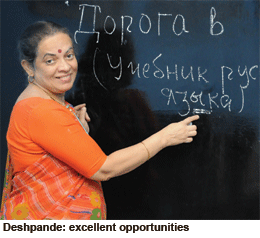With traditional Indo-Russian business and trade ties becoming stronger, acquiring professional certification in the Russian lang-uage can open doors to well-remunerated globetrotting careers
With sophisticated information technology having created a global marketplace by facili-tating real-time communication across continents, studying a second foreign language (apart from English) as a primary or supplementary job skill could open the doors to a globetrotting career or help get that much-awaited prom-otion. Among the popular options for Indian youth is learning the Russian language, given that India has always had close cultural and trade ties with Russia (formerly the Soviet Union) since independence.
Following integration of the Indian economy with the global post the liberalisation initiative of 1991, and the growing volume of international trade, the demand for qualified language professionals, particularly translators, has risen exponentially. Business process outsourcing companies are always on the lookout for professionals fluent in foreign languages; export promotion councils want cons-ultants to provide a gamut of foreign language related services; IT multinationals are perennially hunting for multi-lingual web developers, designers and market researchers; and book publishers need writers and editors for delivering quick, competitive and quality translations. With Indo-Russian commercial ties becoming stronger, job opportunities exist in several other vocations — government tourism departments, private travel agencies and hotels and airlines — all of whom require Russian language professionals.
 Most major universities offer diploma, degree or certificate study programmes in one or more foreign languages. Admission eligibility criteria differ, but most admit graduates of any discipline. The duration of the programmes varies with a minimum study period of six months required for certificate courses. Moreover, several foreign language training institutes including the cultural centres of Russia attached to consulates in New Delhi, Mumbai, Kolkata, Chennai and Trivandrum, offer Russian language education of different levels.
Most major universities offer diploma, degree or certificate study programmes in one or more foreign languages. Admission eligibility criteria differ, but most admit graduates of any discipline. The duration of the programmes varies with a minimum study period of six months required for certificate courses. Moreover, several foreign language training institutes including the cultural centres of Russia attached to consulates in New Delhi, Mumbai, Kolkata, Chennai and Trivandrum, offer Russian language education of different levels.
For individuals who have acquired graduate level proficiency in Russian, the CIEFL (Central Institute of English and Foreign Languages), Hyderabad, offers Masters correspondence-cum-attendance courses for diploma/degree holders. The Jawaharlal Nehru Univer-sity (JNU) School of Languages, New Delhi, offers a five-year integrated Masters programme in Russian to Plus Two school-leavers. Admission is on the basis of an entrance test. Students completing the three-year BA (Hons) Russian language programme automa-tically become eligible for the two-year Masters programme. It’s well acknow-ledged that JNU offers the most comprehensive foreign languages study programmes.
Apart from academic institutions and private and public sector organisations, the United Nations is the world’s largest employer of language translators, editors and interpreters. It employs an army of bilingual professional economists, educationists, financial analysts, and public information officers. The demand for multi-lingual proficiency is high even in the NGO sector. Russian language certified professionals can earn betw-een Rs.50,000 to several lakhs per month depending on their level of expertise and familiarity with the language. Career opportunities for certified graduates in Russian are excellent in academia, industry, government, and trade and tourism.
“State-of-the-art communication technology is fast breaking down barriers separating countries and cultures. Studying Russian as a primary or supplementary language could open up exciting career opportunities,’’ says Dr. Suniti Deshpande, head of the language department and senior manag-ement executive of the Cultural Centre of Russia in Mumbai.
An English and russian postgrad of Shivaji University, Kolhapur, and Karnatak University, Dharwad where she studied English and Russian respectively, Deshpande pressed on to acquire a Ph D from the Pushkin Institute, Moscow. With these bi-lingual qualifications, she was signed up by the Cultural Centre of Russia, Mumbai as lecturer in Russian and English, an institution she has served for 26 years as a writer, translator and interpreter. In 2006, she was conferred a lifetime achievement award by Russia’s President Vladimir Putin.
The centre offers certificate, diploma, advanced diploma and translation study programmes, each of six months duration. On completion of the advanced diploma, the natural progression is to sign up with companies trading with Russia to work as freelance interpreters and translators. “Our courses also attract businessmen from the pharmaceutical, diamonds and textile industries who have trade links with Russia. We also offer Russian music and ballet classes conducted by Russian teachers,” says Deshpande, who believes that learning a second foreign language has become essential for youth in the newly emergent global village.
Because of its Sanskrit roots, Russian is relatively easy to learn for Indians. “Russian, which has a rich literary tradition offers the opportunity to read some of the world’s best literature in the language. Russian fluency is also a valuable asset for trade and business with the country,’’ says Deshpande.
Dasvidaniya!
Indra Gidwani (Mumbai)